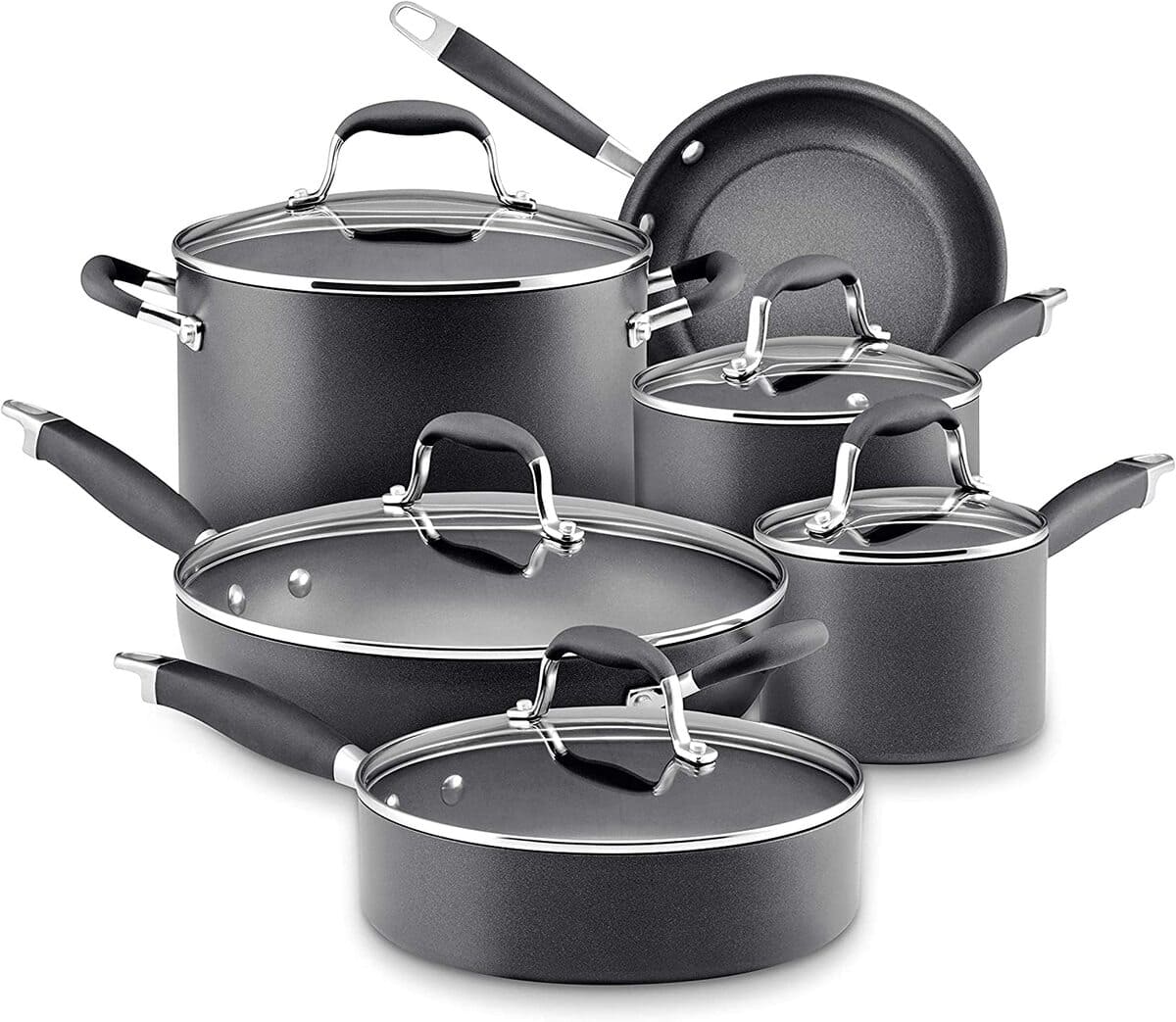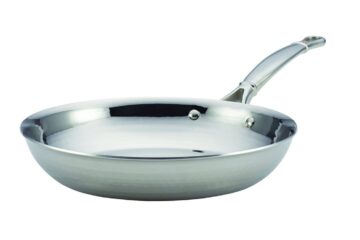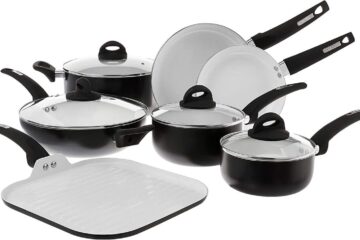Anolon cookware is a popular choice for many home cooks due to its durability and non-stick surface. However, one common question that arises is whether Anolon cookware is oven safe. The answer to this question varies depending on the specific type of Anolon cookware being used.
For example, Anolon Nouvelle Copper Stainless Steel Cookware is oven safe up to 500°F, making it a great option for recipes that require high-temperature cooking. On the other hand, Anolon X Premium Non-Stick Cookware with SearTech™ is not recommended for use in the oven, as the non-stick surface may not hold up well under high heat. It’s important to always check the manufacturer’s instructions before using any cookware in the oven to ensure safety and prevent damage.
What is Anolon Cookware?
Anolon is a brand of cookware that offers a wide range of products, including stainless steel, non-stick, and hard-anodized cookware. The company was established in 1984 and has since become a popular choice for home cooks and professional chefs alike.
One of the key features of Anolon cookware is its durability. The hard-anodized construction makes the cookware resistant to scratches, chips, and other damage. This means that the cookware can last for many years with proper care and maintenance.
In addition to its durability, Anolon cookware is also known for its even heat distribution. The products are designed to distribute heat evenly across the surface of the cookware, which helps to prevent hot spots and ensures that food is cooked evenly.
Another advantage of Anolon cookware is its versatility. The cookware is designed to be used on a variety of cooking surfaces, including gas, electric, and induction cooktops. Some products are even oven-safe, which allows for greater flexibility when cooking.
Is Anolon Cookware Oven Safe?
When it comes to cooking, one of the most critical aspects to consider is the cookware’s safety. Anolon is a popular brand that offers a wide range of cookware. If you are wondering whether Anolon cookware is oven safe, the answer is yes. However, there are a few things to keep in mind.
Understanding Anolon Cookware’s Construction
Anolon cookware is constructed using different materials, including stainless steel and hard-anodized aluminum. The construction of the cookware determines its oven-safe temperature range. For instance, stainless steel cookware can withstand high temperatures of up to 500°F, while hard-anodized aluminum cookware can withstand temperatures of up to 400°F.
Anolon Cookware’s Oven-Safe Temperature Range
Anolon cookware is oven safe up to a certain temperature range, depending on the material used in its construction. For example, Anolon’s stainless steel cookware is oven safe up to 500°F, while hard-anodized aluminum cookware is oven safe up to 400°F. It is essential to check the manufacturer’s instructions to determine the oven-safe temperature range for your specific Anolon cookware.
Anolon Cookware’s Oven-Safe Lids
Anolon cookware comes with different types of lids, including glass and stainless steel lids. Glass lids are oven safe up to a certain temperature range, while stainless steel lids are oven safe up to 500°F. It is vital to check the manufacturer’s instructions to determine the oven-safe temperature range for your specific Anolon cookware lid.
Anolon Cookware’s Oven-Safe Handles
Anolon cookware handles are designed to withstand high temperatures. However, the temperature range varies depending on the material used in the handle’s construction. For example, stainless steel handles are oven safe up to 500°F, while silicone handles are oven safe up to 400°F. It is crucial to check the manufacturer’s instructions to determine the oven-safe temperature range for your specific Anolon cookware handle.
How to Check if Your Anolon Cookware is Oven Safe
When it comes to cooking, one of the most important things to consider is the safety of the cookware. Anolon cookware is known for its durability and non-stick features, but is it oven safe? Here are some ways to check if your Anolon cookware is safe to use in the oven.
Check the Manufacturer’s Instructions
The first place to look for information on oven safety is the manufacturer’s instructions that come with your Anolon cookware. These instructions will typically provide information on the recommended temperature range for your cookware, as well as any oven safety warnings or restrictions.
Look for Oven-Safe Labels on the Cookware
Another way to determine if your Anolon cookware is oven safe is to look for any oven-safe labels that may be present on the cookware itself. These labels may be located on the bottom of the cookware or on the handles. If you see an oven-safe label, it is an indication that the cookware is safe to use in the oven.
Check for Oven-Safe Symbols on the Cookware
In addition to oven-safe labels, some Anolon cookware may also have oven-safe symbols. These symbols may include an image of an oven or a temperature range that indicates the safe temperature range for the cookware. If you see these symbols, it is another indication that the cookware is safe to use in the oven.
It is important to note that not all Anolon cookware is oven safe. Some models may not be able to withstand the high temperatures of the oven, which can cause damage to the cookware or even create a safety hazard. By following these simple steps, you can ensure that your Anolon cookware is safe to use in the oven and enjoy all the benefits of this high-quality cookware.
What to Avoid When Using Anolon Cookware in the Oven
When using Anolon cookware in the oven, there are a few things to keep in mind to ensure safety and avoid damage to the cookware.
Using Cookware Above its Oven-Safe Temperature Range
Anolon cookware is designed to be oven safe up to a certain temperature range, typically around 400-500°F. Using the cookware above its oven-safe temperature range can cause damage to the nonstick coating, warping of the pan, or even a potential safety hazard. It is important to check the oven-safe temperature range of the specific Anolon cookware being used and to not exceed that temperature.
Using Cookware with Damaged or Loose Handles or Lids
Cooking with Anolon cookware that has damaged or loose handles or lids can be dangerous. Loose handles or lids can cause spills or accidents when removing the cookware from the oven. Damaged handles or lids can also cause the cookware to become unstable or even break apart in the oven. It is important to inspect the cookware for any damage before use and to avoid using damaged cookware in the oven.
Using Cookware with Non-Oven Safe Components
Anolon cookware typically features nonstick coatings and other components that are oven safe. However, some Anolon cookware may have parts or components that are not oven safe, such as plastic or silicone handles. Using cookware with non-oven safe components can cause damage to the cookware or even release harmful chemicals into the air. It is important to check the specific Anolon cookware being used for any non-oven safe components and to avoid using that cookware in the oven.
Conclusion
In conclusion, Anolon cookware is a great option for those looking for affordable, high-quality cookware. The brand offers a variety of collections with different features, including non-stick and stainless steel options.
When it comes to oven safety, Anolon cookware is generally safe to use in the oven, with many collections being oven safe up to 500°F. However, it is important to always check the specific product’s instructions and limitations before using it in the oven.
Overall, Anolon cookware is a reliable choice for home cooks and professional chefs alike. Its durability, affordability, and versatility make it a great investment for any kitchen.


